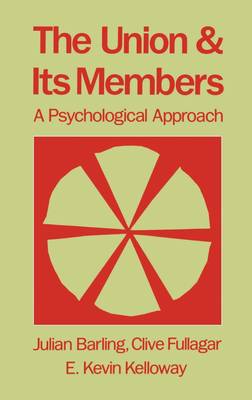
Door een staking bij bpost kan je online bestelling op dit moment iets langer onderweg zijn dan voorzien. Dringend iets nodig? Onze winkels ontvangen jou met open armen!
- Afhalen na 1 uur in een winkel met voorraad
- Gratis thuislevering in België vanaf € 30
- Ruim aanbod met 7 miljoen producten
Door een staking bij bpost kan je online bestelling op dit moment iets langer onderweg zijn dan voorzien. Dringend iets nodig? Onze winkels ontvangen jou met open armen!
- Afhalen na 1 uur in een winkel met voorraad
- Gratis thuislevering in België vanaf € 30
- Ruim aanbod met 7 miljoen producten
Zoeken
€ 288,45
+ 576 punten
Omschrijving
This work explores three key topics in social psychology: the manner in which labor unions shape organizational behavior, a relationship which has been effectively ignored in the literature; the organization of the union itself, a fascinating test case for the organizational psychologist; and the way in which theories and methods of organizational psychology may assist labor organizations in achieving their goals. Since the union maintains unique characteristics of democracy, conflict, and voluntary participation within a larger organization, the authors offer a detailed study of a union's dynamics, including demographic and personality predictors of membership, voting behavior, union commitment and loyalty, the nature of participation, leadership styles, collective bargaining, among other topics. This is the first book to be published in the new Industrial/Organizational Psychology Series. It will be of interest to not only industrial/organizational psychologists in industry, academia, and private and public organizations, but to graduate students in psychology departments and business schools, and to academics and professionals in business and management studying industrial relations.
Specificaties
Betrokkenen
- Auteur(s):
- Uitgeverij:
Inhoud
- Aantal bladzijden:
- 264
- Taal:
- Engels
- Reeks:
Eigenschappen
- Productcode (EAN):
- 9780195073362
- Verschijningsdatum:
- 8/10/1992
- Uitvoering:
- Hardcover
- Formaat:
- Genaaid
- Afmetingen:
- 161 mm x 242 mm
- Gewicht:
- 498 g

Alleen bij Standaard Boekhandel
+ 576 punten op je klantenkaart van Standaard Boekhandel
Beoordelingen
We publiceren alleen reviews die voldoen aan de voorwaarden voor reviews. Bekijk onze voorwaarden voor reviews.











